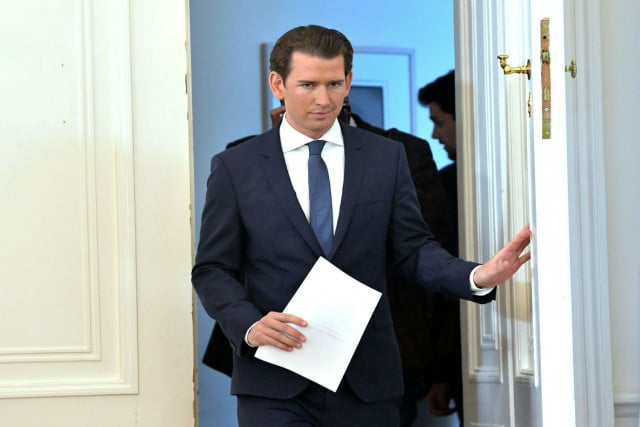Kurz – once hailed as a “wunderkind” of Europe’s conservatives – stepped down as chancellor in 2021 following a string of graft accusations, including spending public money for favourable media coverage.
It marked the spectacular fall of the charismatic hardliner, who became the world’s youngest democratically elected head of government in 2017 at age 31.
Prosecutors said they have charged Kurz, his former chief of staff Bernhard Bonelli, and a third person with providing false testimony to a parliamentary committee probing numerous graft allegations.
The trial has been set for 18 October and is expected to last three days, with a possible decision due on 23 October, the Vienna criminal court said.
Kurz, 36, has repeatedly dismissed the accusations levelled against him.
If found guilty, he could face up to three years in jail.
READ ALSO: Austrian Chancellor facing investigation over ‘false statement’ to MPs
Leaked chats
The investigation by the state economic crime and corruption prosecutor (WKStA) into Kurz allegedly making false statements to a committee of lawmakers wrapped up in January.
In statements to the parliamentary committee, Kurz downplayed his influence in appointing then-finance ministry official, Thomas Schmid, to head the state-run company OeBAG.
But chat messages leaked to the media about the process of setting up OeBAG suggested that both men had discussed the matter.

In a message laced with ‘kiss’ emojis, Kurz wrote to Schmid: “You get everything you want”.
Schmid replied: “I’m so happy. I love my chancellor.”
Ahead of the indictment Kurz said on X, formerly known as Twitter, that the “allegations are false” and his team was looking forward to them being proven “unfounded in court”.
Earlier this year, Kurz’s lawyer Werner Suppan said that 30 witnesses so far have exonerated his client with their statements.
Ibiza scandal
In a separate case, prosecutors are investigating Kurz on suspicion of embezzling public funds to pay for polls, which were skewed to boost his image, and favourable coverage to help his political rise.
Kurz’s first government was brought down when the so-called “Ibizagate” scandal engulfed his far-right junior coalition partner in 2019.
A video, filmed secretly on the Spanish resort island of Ibiza, showed the then vice chancellor Heinz-Christian Strache offering public contracts to a woman posing as a Russian oligarch’s niece in exchange for campaign help.
In the wake of “Ibizagate”, Austria tightened its anti-corruption law, making it punishable to accept or solicit a bribe and then successfully run for office.
With the legal changes that take effect from September, Austria sought to close a loophole, allowing the prosecution of corruption committed before someone takes office.
Kurz is now involved in numerous private international enterprises, including launching a cybersecurity company with the ex-head of Israel’s NSO Group, which makes controversial Pegasus spyware.
The conservative Austrian People’s Party (ÖVP), which Kurz headed until 2021, continues to govern in a coalition with the Greens — but their approval ratings have plummeted.
READ ALSO: Alleged mastermind in Austria’s ‘Ibiza-gate’ video arrested in Berlin



 Please whitelist us to continue reading.
Please whitelist us to continue reading.
Member comments